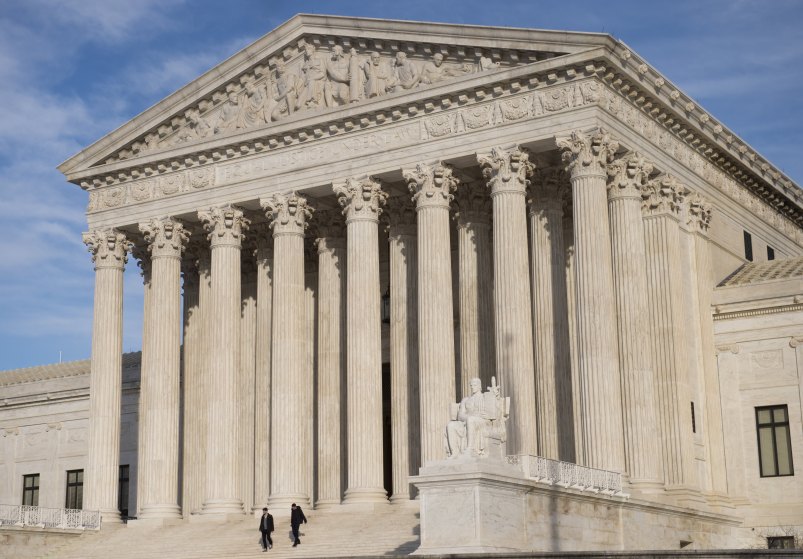The Supreme Court rejected a challenge brought against the Republican-drawn legislative map in Wisconsin, in an unanimous decision that said the challengers who had sued over the map did not have standing.
Monday’s decision appeared to punt on the substantive issues in the case: whether an extreme partisan gerrymander can amount to a constitutional violation. The high court is sending the case back down to the lower court to allow the challengers to Wisconsin’s map to narrow their lawsuit.
“We express no view on the merits of the plaintiffs’ case,” Chief Justice John Roberts wrote the majority’s opinion.
Justice Elena Kagan wrote a concurring opinion, where she was joined by Justices Ruth Bader Ginsburg, Stephen Breyer and Sonia Sotomayor. Justice Clarence Thomas also wrote a concurring opinion where he was joined in part by Justice Neil Gorsuch.
Roberts, in his opinion, wrote that the voters could only challenge the drawing of the specific districts in which they vote, and not the entirety of a state’s map, as had been done in the Wisconsin case before the court, Gill v. Whitford.
“To the extent the plaintiffs’ alleged harm is the dilution of their votes, that injury is district specific. An individual voter in Wisconsin is placed in a single district. He votes for a single representative,” Roberts said. “The boundaries of the district, and the composition of its voters, determine whether and to what extent a particular voter is packed or cracked.”
The case was highly watched for whether the Supreme Court would intervene in partisan gerrymanders. Those hoping that the court would clear up when a legislature went too far in boosting a partisan advantage in drawing legislative districts were left disappointed Monday.
“We leave for another day consideration of other possible theories of harm not presented here and whether those theories might present justiciable claims giving rise to statewide remedies,” Roberts said.
Rather than directly dismiss the case, Roberts said that the high court was sending it back to the lower court level “so that the plaintiffs may have an opportunity to prove concrete and particularized injuries using evidence—unlike the bulk of the evidence presented thus far—that would tend to demonstrate a burden on their individual votes.”
Kagan, in her concurrence said she supported Roberts’ move to let the challengers offer more evidence that their votes voters had been diluted by Wisconsin’s map, but said that statewide evidence should also play a role in assessing their claims. She said that a state-wide remedy may also ultimately be warranted.
“It all depends on how much redistricting is needed to cure all the packing and cracking that the mapmakers have done,” she said.
Thomas’ concurrence said that he agreed with Roberts that the challengers lacked standing, but argued that their case should have directly dismissed rather than sent back to a lower court.
The Court also declined Monday to address the merits in a Maryland partisan gerrymandering case brought against the state’s Democratic-drawn legislative map. The Supreme Court said in a per curiam decision — meaning one not ascribed to any individual justice — that the lower court had been correct in rejecting the challengers’ request that it temporarily block Maryland’s map.
Read the Wisconsin opinion:







Thanks for waiting 8 months to tell us you fucking assholes!
When you are able to look at American politics in terms of geological time, it’s all good.
So, the Court avoided the merits by dismissing for lack of standing. But it remanded the case to the lower court to give the plaintiffs a chance to meet the criteria for standing articulated by the Court. To demonstrate standing, the Court held that the voter must show legislative-district-specific harm to his interest in fair representation. Perhaps the plaintiffs counsel should amend the complaint to add plaintiffs from every legislative district, all of whom have been aggrieved by the legislative boundaries. That sounds laborious but doable.
So, bring the case in the right way and we might consider it.
But, you won’t have time to do it before 11/2018.
This is the sickening reality we face; the conservative monsters who want to destroy democracy are doing it like this; they’re winning in the weeds where it’s hard to see how corrosive it is. It’s the same tactic used by crazy evangelical extremists who get on school boards and other local agencies in order to indoctrinate children and gullible citizens with their poisonous superstitions (religion). This is really depressing.